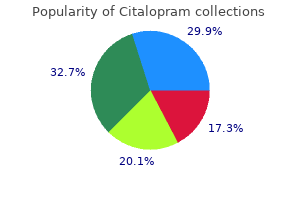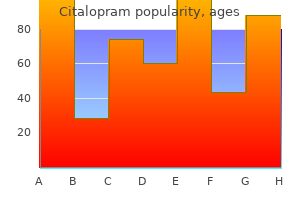"Buy 10mg citalopram, symptoms 4 months pregnant".
By: K. Tempeck, M.A., M.D., Ph.D.
Medical Instructor, University of Nevada, Las Vegas School of Medicine
Buy genuine citalopram
The same perturbation then results in greater wear and tear and further decreases effector efficiency. Eventually, even with the effectors activated continuously, the 211 Principles of Autonomic Medicine v. Finally, when the effectors fail, the organism can no longer mount a stress response at all. One can conceptualize the existence of a unitary adrenal (adrenocortical/adrenomedullary) system just as well as a unitary sympathoadrenal system. Distress A non-circular definition is required to enable experimental testing about the health consequences of distress. An organism experiences distress when it perceives the inadequacy of compensatory adjustments to either a psychological or physiological stressor. Distressed organisms avoid situations that are perceived as likely to reproduce the same aversive experience. The experience of distress enhances vigilance behavior and long-term memory of the distressing event. These are adaptive adjustments that must have offered tremendous survival advantages in evolution. In considering potential long-term health consequences of distress, such as post-traumatic stress disorder, one must bear in mind its important survival advantages. Most animals can react instinctively not only to a stressor but also to symbolic substitutes that resemble the natural stimulus. The plasticity afforded by learning decreases the likelihood of inappropriate instinctive responses to symbolic cues. Instrumental conditioning, or operant conditioning, represents an even more advanced form of learning that requires a cerebral cortex. If an organism experienced distress consistently in a given situation, subsequent perception of re-exposure to the situation could elicit distress as a classically conditioned response.
Buy 10mg citalopram
The resident must complete all years of education for which the program is accredited. Programs that extend the residency beyond 72 months must present a clear educational rationale consonant with the program requirements and the objectives of the residency. The program director must obtain the approval of the sponsoring institution and the Review Committee prior to implementation and at each subsequent accreditation review of the program. Before entry into the program, each resident must be notified in writing of the required length of the program. This period may not be changed for a particular resident during his or her program unless there is a significant break in his or her education, or the resident needs remedial education. Residents must have a minimum of three months of structured education in general patient care to include rotations in surgery, critical care, trauma, and other related rotations as determined by the program director. The program must provide 42 months of clinical neurological surgery at the sponsoring institution or one of its approved participating sites. A minimum of 21 months of neurological surgery education must occur at the sponsoring institution. The remaining time not devoted to clinical neurology and neurological surgery should be spent in the study of the basic sciences, neuroradiology, neuropathology, or other appropriate subject matter related to the neurosciences. These topics should be agreed upon by individual residents and the program director. The program director should consult the American Board of Neurological Surgery for certification requirements concerning any training conducted outside the approved sites of the program. The program must provide residents with experience in direct and progressively responsible patient management experience as they advance through training. Residents must spend a 12-month period of time as chief resident on the neurological surgery clinical service in the sponsoring institution or its approved participating sites. Sponsoring Institution One sponsoring institution must assume ultimate responsibility for the Neurological Surgery 3 193 program, as described in the Institutional Requirements, and this responsibility extends to resident assignments at all participating sites. The sponsoring institution and the program must ensure that the program director has sufficient protected time and financial support for his or her educational and administrative responsibilities to the program. The sponsoring institution for a neurological surgery program must be in a single geographic location. The institution must demonstrate commitment to the program in terms of financial and academic support, including timely appointment of a permanent department or division chairperson of neurological surgery. An integrated site must function as a single neurological surgery service with the sponsoring institution. The program director must demonstrate to the Review Committee that the clinical service operates as a single unit in the assignment of residents and their faculty supervisors, the formulation of call schedules, and the convening of teaching conferences and related educational activities.

Discount citalopram
Siblings are best able to thrive when they can spend quality time alone with their parents, when they are provided with developmentally appropriate medical knowledge, and when they truly feel that they are an integral part of the family (6). Perceptions of the medical care required by their siblings may be more frightening or more idealized than reality. Families must make every attempt to appreciate the emotional journey of the sibling donor, a journey that can be markedly different if the sibling is a match or not, or if the transplant is successful or not. Age-appropriate information and emotional support are essential throughout the process. Stem cell donors have their own experiences, which need to be heard and acknowledged. The experience of each affected child will have its own impact on the other affected children. It is important that affected and non-affected siblings have opportunities to talk with each other and with their parents. Sibling relationships can be among the strongest in life and need to be cultivated and nurtured. If parents create an environment that allows for questions, discussions, and an expression of feelings, children will feel free to ask them for information about their illness and treatment options, and become active participants in their own disease management (7). In addition to what they have been told, children pick up information from ambient conversations, have independent interactions with professionals, and surmise things from the emotional climate around them. Children will ask questions when they want to know about a particular issue, but will often shy away from questions to which they do not want the answers or to which they have not gotten responses in the past. Children are good regulators of their own knowledge base, providing cues to the adults around them at all junctures. Once children are able to read and have access to the Internet, they often perform online searches about their illness. At each stage of development, children need age-appropriate explanations of their diagnosis and treatment. Information offered regularly to children will enhance their ability to understand their disease and establish trusting relationships. As they 340 Chapter 18: Psychosocial Issues get older and medical problems emerge, groundwork set in earlier years will encourage affected individuals to rely on health care providers for answers and advice. This information builds trust and engages children as active participants in their own care. School-related concerns School is a powerful normalizing environment for children.
Buy genuine citalopram. Aura Migraine - 5 Facts You NEED to Know About Vision Loss from Visual Aura.
Diseases
- Urioste Martinez Frias syndrome
- Chromosome 17, deletion 17q23 q24
- Physical urticaria
- Aortic dissection lentiginosis
- Hereditary fructose intolerance
- Tuberculosis
- Metatrophic dysplasia
- Trachoma
- Dysfibrinogenemia, familial
- Granulomatous rosacea


